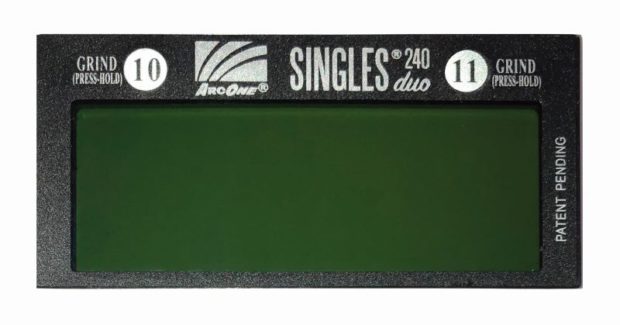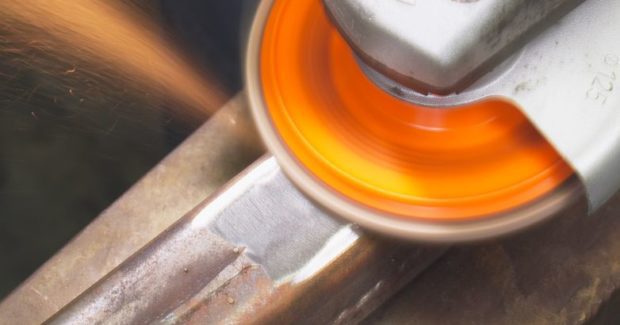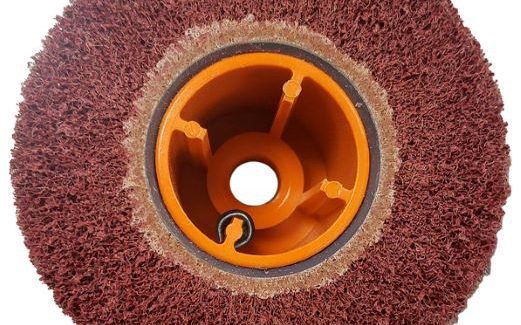Work Smarter from Start to Finish
Finishing solutions are designed to help metalworkers increase productivity. In three easy steps, you can achieve your desired finish and create products made to withstand industrial wear and tear.
Posted: October 7, 2021
TOOLING & WORKHOLDING
By Cedrik Rochon
Metal finishing is a tedious process that requires time and precision. Because stainless steel tends to be more expensive than other steel options, it is imperative that workers use the right tools and processes to avoid wasting time and money. More industries recognize the importance of working efficiently, comfortably and with less fatigue.
Achieve your desired finish, increase productivity and maximize cost savings by following three simple steps.
STEP 1 — WELD BETTER
When it comes to welding, personal safety is not a choice. A welding helmet is an investment, not a necessity. The challenge is determining which helmet makes the most sense. Automatic darkening filtering (ADF) helmets are an effective way to ensure protection of a welder’s eyes and face. With ADF technology, the welder will not have to flip up his/her helmet to perform tasks. This can prevent both neck strains and injuries.
When looking into ADF technology, there are many factors to consider. For example, ADF welding lenses are offered in fixed or variable shades. Variable shades allow the welder to perform a wider variety of welding applications, while single shade ADF lenses, though cost effective, only offer one dark shade.
Features like grind mode adds the capability to grind down a weld or cut metal without having to change face protection saving both time and money.
HD technology specific to ArcOne® increases the range of visible light when looking through the lens, and while welding. This provides a clearer, more defined view of the work area. This is especially important when working with stainless steel. You want to get it right the first time.
Auto-darkening lenses are available in multiple sizes with varying options: shade, sensitivity and viewing area. ArcOne® can retrofit your current helmet.
STEP 2 – BLEND WELDS FASTER
The wrong abrasive can lead to a poor removal rate, as well as wheels being prematurely discarded. An unproductive and long process can result in operator fatigue. Both factors can lead to high costs and inefficient production. Workers should be equipped with the proper tools and understand how to work smarter. To maximize performance and productivity, it’s important to keep in mind the application and the material that will be worked on, as this will impact the selection of abrasives.
Abrasives that are too coarse could gouge the surface and ruin your workpiece. For novice operators, we recommend starting with a finer grit. Once familiarized with the speed, pressure and angle, move up to a coarser abrasive for faster material removal.
When choosing a flap disc, look for a product family that offers a complete solution, regardless of the weld (TIG or MIG), removal rate (light to rough) or material (steel, stainless steel, aluminum).
Certain flap discs self-sharpen as they work, providing both an aggressive removal rate and an excellent finish. You may already know what finish you can expect from different grits (i.e., 40, 60, 80, 120, etc.), but certain abrasives like the ENDURO-FLEX TURBO™ have a dual grit. Its unique grit 36/60 ceramic grain blend removes material quickly (like a 36 grit), but leaves a finer 60 grit, paint-ready finish, saving you a valuable step in the finishing process.
For example, when working on steel structural parts that require a coating, a coarser grit flap disc like grit 36/60 will help get the job done faster, while providing a paint-ready finish that can be coated right away. When working with stainless steel to achieve a sanitary #4 brushed finish for the food and beverage industry, different steps need to be followed. Start by using a flap disc that provides a finer finish, but still offers high performance, like the ENDURO-FLEX 2-IN-1™, followed by finishing drums.
Substantially reduce your costs by combining two finishing steps in one. Flap discs that offer a two-in-one feature remove TIG welds and finish the surface using one disc instead of two.
Some flap discs offer a trimmable backing, extending disc life and reducing trips to the tool crib, saving time and money while maximizing productivity.
STEP 3 – FINISH SMARTER
Selecting the right power tool is key for finishing applications. Match any linear finish and reduce your finishing costs by using a versatile variable-speed tool like the LINE-MATE III™. Blending drums are used at much lower speeds than flap discs – generally at 2000 rpm. Working with a dedicated tool ensures that the RPM remains constant under load for a uniform finish every time. Ergonomically, the right finishing power tool allows you to keep a better posture and uniform pressure to achieve the desired finish quickly and with minimal effort.
Pair your tool with individually balanced drums to avoid vibration, and to provide a consistent and uniform finish. Higher quality drums have noticeably less vibrations. They are individually balanced during production using laser technologies. The specially placed weights compensate for density variations of the non-woven material. High-quality, non-woven grain and fiber provide high performance throughout the product life. Higher-quality materials decrease the risk of smears and contamination of the surface. Threaded spin-on drums reduce changeover time and eliminate the need for clamping nuts or extension tools.
For a brushed linear finish, use drums like WALTER’s TWO-IN-ONE™ combining two finishing steps into one. The coated abrasive cloth cuts aggressively, while the interwoven BLENDEX™ flaps produce a satin linear finish. Combined, the blend of materials reduces the average height between surface peaks and valleys, reaching a lower Ra between 12 and 16 (#4 finish) in one step. Standard drums are offered in various grit levels to reach a wider range of finishes in a multi-step approach. BLENDEX drums are used to polish, burnish, blend, deburr, clean and brighten, depending on the grit level (from coarse to super-fine).
Cedrik Rochon is an R&D engineer – finishing solutions for Walter Surface Technologies. Learn more: https://hubs.ly/H0SL-n70.

















